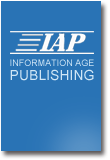
Volume X: Justice, Equity, Diversity, and Inclusion in Education
School-University-Community Research
Edited by:
R. Martin Reardon, East Carolina University
Jack Leonard, University of Massachusetts Boston (retired)
A volume in the series: Current Perspectives on School/University/Community Research. Editor(s): R. Martin Reardon, East Carolina University. Jack Leonard, University of Massachusetts Boston (retired).
Call for Chapters
"The problem is to achieve some measure of excellence [equity] in this society, with all its beloved and exasperating clutter, with all its exciting and debilitating confusion of standards, with all the stubborn problems that won't be resolved and the equally stubborn ones that might be." ~ John W. Gardner — Excellence: Can We Be Equal and Excellent Too?Against a sometimes bleak backdrop, individuals are aware of the “long arc of the moral universe” bending towards justice (King, 1968, 44:54-44:57). For example, soccer fans and many others applauded the maturity and optimism of the response of Adams (the U.S. Soccer captain) in the face of aggressive questioning at the 2022 World Cup. A journalist queried Adams about how a Black U.S. citizen could support a country in which there was such discrimination against Black people. Adams responded: “One thing that I’ve learned, especially from living abroad in the past years and having to fit in different cultures, is that in the US, we’re continuing to make progress every single day” (Kane, 2022, para. 14).
Policies of inclusion and declarations of commitment to justice, equity, diversity, and inclusion are laudable signs of institutional progress. However, in some cases, theory may not accord with practice. For example, in Okpokodu’s (2022) case as a faculty member, the academic playing field has been intolerably tilted against them—they have been rendered functionally invisible in their institution. Despite their academic credentials, “I still am and remain the perpetual second-class citizen and at the bottom of the totem pole” (p. 64).
Calabrese Barton and Tan (2020) acerbically pointed out: “Systemic injustices are made invisible through their regularities in practice” (p. 433). They advocated for a “framework of rightful presence” (p. 434) and went on to assert that focusing only on inclusion constrains systemic reform. Instead, they proposed three tenets that set the bar appropriately high which I paraphrase as: (a) an individual’s static right to be in an instructional space must be accompanied by a right to critique the political underpinnings of that instructional space, (b) political struggle within the instructional space must be oriented to making injustice visible, and (c) the disruption of “normative knowledge/power relationalities . . . grounded in White, patriarchal dominance” (p. 437) must be the norm.
We invite submissions from researchers who are engaging in research related to justice, equity, diversity, and inclusion at the intersection of school, university, and community—research that is focused on outcomes for students, families, and/or communities (e.g., student engagement/academic outcomes, access to and use of community-based resources, social-emotional learning, school choice, career and college readiness) and/or educators (e.g., support systems, instructional tools/approaches, health and well-being, retention, preparation). We welcome chapter proposals of no more than 500 words (in Microsoft Word, double-spaced, Times New Roman 12 pt.). Please cite at least 10 sources and include a reference page. The proposal cover page must contain full contact information of the corresponding author and any coauthors. [Reference list for this call for chapters available on request.]
TENTATIVE SCHEDULE FOR PUBLICATION:
Chapter Proposals: March 13, 2023
Invitation to Contribute a Chapter: March 27, 2023
Draft Chapters for Blind Peer Review: June 5, 2023
Return of Blind Peer Reviewed Chapters: June 26, 2023
Submission of Final Chapters to IAP: October 15, 2023
Anticipated Publication: Spring 2024
Please email chapter proposals as Microsoft Word attachments to both Dr. Martin Reardon (reardonr@ecu.edu) and Dr. Jack Leonard (jack.leonard@umb.edu). Prior inquiries are welcome.
BUY ONLINE
- This title is in development and is not yet available to order online. Please call the IAP office for more information: 704.752.9125

CATEGORIES
CLASSIFICATION
RELATED TITLES
-
 A Place Called Home
School-University-Community Collaboration and the Immigrant Educational Experience
A Place Called Home
School-University-Community Collaboration and the Immigrant Educational Experience
-
 Alleviating the Educational Impact of Adverse Childhood Experiences
School-University-Community Collaboration
Alleviating the Educational Impact of Adverse Childhood Experiences
School-University-Community Collaboration
-
 Integrating Digital Technology in Education
School-University-Community Collaboration
Integrating Digital Technology in Education
School-University-Community Collaboration
-
 Learning to Read the World and the Word
School-University-Community Collaboration to Enrich Immigrant Literacy and Teacher Education
Learning to Read the World and the Word
School-University-Community Collaboration to Enrich Immigrant Literacy and Teacher Education
-
 Making a Positive Impact in Rural Places
Change Agency in the Context of School-University-Community Collaboration in Education
Making a Positive Impact in Rural Places
Change Agency in the Context of School-University-Community Collaboration in Education
-
 School-University-Community Collaboration for Civic Education and Engagement in the Democratic Project
School-University-Community Collaboration for Civic Education and Engagement in the Democratic Project
-
 School-University-Community Research in a (Post) COVID-19 World
School-University-Community Research in a (Post) COVID-19 World
